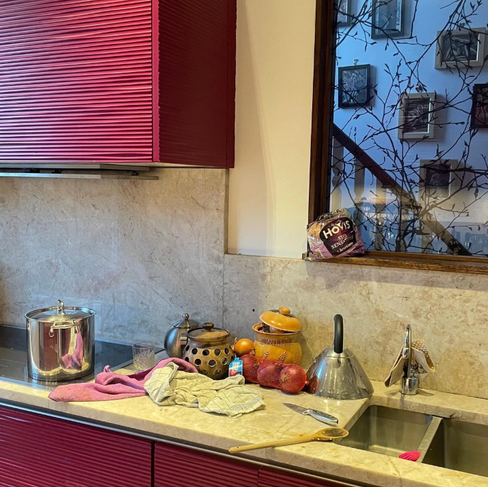Design Detail: How We Solved the Kitchen Extractor Puzzle
- Leo Wood
- Oct 27, 2025
- 2 min read
Updated: Oct 28, 2025
At Kinder Design, kitchen design is never just about the finishes, it’s about solving the right problems, in the right order.
One of the most overlooked (but crucial) questions in a kitchen renovation? What type of extractor will actually work best for your layout, lifestyle and space. Extractor fans aren’t exactly the sexiest part of kitchen design - but they are essential for a space that functions well. If they’re handled early and thoughtfully, they can make or break your kitchen’s flow and overall look.
Overhead vs Downdraft Kitchen Extractor - and Why It Matters Early
In our Waterloo kitchen project, we inherited a bold, magenta-coloured kitchen, full of quirky charm but in need of a functional and aesthetic re-think. The original overhead extractor was large and clunky, hidden inside a bulky cabinet that took up visual space and made the room feel crowded.
Instead of concealing it again, we went the other direction and exposed it.
We opted for a minimalist stainless steel extractor, leaving the appliance out in the open and creating breathing room for the beautiful, bespoke handmade tiles we’d commissioned from ceramicist Charlotte Moore. This small switch made a big impact -freeing up the wall space, amplifying the textures, and lending a slightly industrial touch that feels at home in a city apartment.
The result? A functional, grounded space where every detail has room to breathe.
Other Extraction Options We Love
Depending on your project, here are a few other options we explore:
Venting hobs, like those from Bora, where the extraction is built directly into the hob surface - a smart option when overhead ducting is complex or visually disruptive.
Downdraft extractors that rise up from the worktop when needed and retract when not in use.
No extractor at all (only for very low-cook households with excellent ventilation).
It all depends on your lifestyle, cooking habits, kitchen layout and budget. There’s no one-size-fits-all answer - and that’s what makes designing kitchens so interesting.

Photos That Show the Difference
Here are some of the before and after images of our Waterloo kitchen, and you’ll see just how much lighter and more spacious the room now feels - without that overbearing extractor box.
Sometimes, a simple rethink is all it takes.
If you’re dreaming of a kitchen that works hard, looks good, and reflects your values, from sustainability to personality, we’d love to help you design it. Get in touch to book a consultation.








